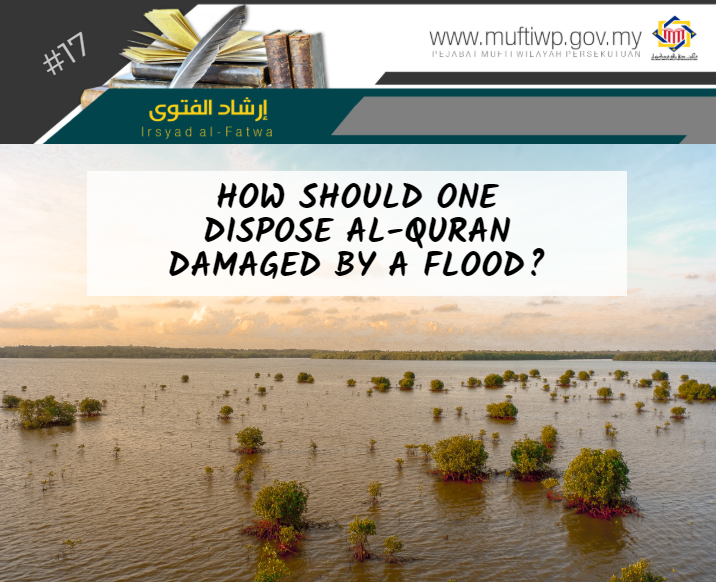Question:
How is the best way to dispose of damaged al-Quran in the flood that recently struck some states of Malaysia?
Answer:
Alhamdulillah, praise and thanks to Allah for the countless blessings He has blessed us all with. Blessings and salutations to the Prophet Muhammad PBUH, his wives, his family, companions and all those that follow his teachings to the day of judgement.
Before we discuss the answer to this question, let us all reflect on the disaster of the flood that had befall some states in Malaysia. Despite this trial, patience, redha and help in terms of money, donations and physical help is offered from various parties. Such efforts should be encouraged and cultivated.
Allah SWT state:
إِنَّا نَحْنُ نَزَّلْنَا الذِّكْرَ وَإِنَّا لَهُ لَحَافِظُونَ ﴿٩﴾
Indeed, it is We who sent down the Qur'an and indeed, We will be its guardian.
Surah al-Hijr (9)
Actually, we have answered this question previously in Irsyad al-Fatwa Series 12. However, this time we will explain it further. Scholars have differing opinions as to how one should dispose of al-Quran; they are divided into two opinions.
First: The opinion in madhhab Hanafi and Hanbali state that it should be buried.
- Scholars of madhhab Hanafi such as al-Haskafi said: “A mushaf in a condition where we can no longer recite it should be buried the same way as a deceased Muslim.” See al-Durr al-Mukhtar 1/191. Sahib al-Hasyiah commented on this, saying: “Place a small piece of cloth inside it (the damaged al-Quran), then it is buried in an honoured place where it is not stepped on.”
- Al-Buhuti, a scholar in madhhab Hanbali said: “If a mushaf is soaked or damaged, then it should be buried. Imam Ahmad said Abu al-Jawza’s mushaf was soaked, then he dug a hole in his mosque and buried it.” See Kasyaf al-Qina’ 1/137.
- Syeikh Muhammad bin Ibrahim al-Syeikh (former Mufti of Saudi Arabia) hold the opinion, the most authentic way when a mushaf is damaged is to bury it in a mosque. If this cannot be done, then it should be buried in a clean and pure place and it is also permissible to burn it. See Lihat al-Fatawa 13/84.
Second: According to the opinion in madhhab Maliki and Syafi’I, it should be burnt.
- The argument for this second opinion is according to the action of Saidina Uthman during his rule, he commanded to burn other mushaf that is different from the mushaf that has been collected and written and this action is witnessed by numerous companions of the Prophet PBUH. This incident is narrated by Imam al-Bukhari in his Sahih 4988. Mus’ab bin Sa’d said: “I found numerous people who witnessed the command of Saidina Uthman to burn other mushaf. This action confuses them but none defy his orders.” Narrated by Abu Bakr bin Bai Daud in his book Kitab al-Masahif, page 41.
- Ibn Battal said: “The order of Saidina Uthman to burn all mushaf when the al-Quran is put together in writing proves the permissibility of burning books which contain the names of Allah SWT (Asma’ullah). Hence, as an honour towards it and protecting it from being stepped on or thrown to other places.” See Syarah Sahih al-Bukhari 10/226.
- Imam al-Suyuti said: “When there is a necessity to dispose a part of the paper of the mushaf because it is soaked or damaged, then it is impermissible to place it in high places for the possibility that it could fall and stepped on. It is also impermissible to tear it with the intention of separating the letters and words of it. Thus, if it is burnt, then it is permissible. The reason is, Saidina Uthman burns other mushaf and no one denies his order.” See al-Itqan fi Ulum al-Qur’an 2/1187
Disposition
After analysing both opinions of whether it should be buried or burnt, we see both are permissible for the purpose is to honour the Quran or mushaf.
However, we are inclined to the arguments in madhhab Syafi’e and Maliki which is for it to be burnt. The action of the companion of the Prophet PBUH such as Saidina Uthman is the ijtihad from him and this is not defied by any other companions, which makes it a strong argument for the permissibility for it to be burnt. The reason is, it is already damaged by the flood and it would be best if the remaining ashes are buried to also celebrate the first opinion from madhhab Hanafi and Hanbali.
Alhamdulillah with the advancement of technology, there is now an incinerator that is able to burn the Quran completely until it turned to just ashes and when the ashes are buried, surely, it will be safe from being degraded or stepped on, this is the best way in honouring the Quran.
This is also applicable for issues regarding the written names of Allah SWT, hadith books, and religious books, where we should honour them by disposing them the same way as the above-stated way of disposing of the mushaf.
Hopefully, this issue could help resolve the issue of disposing of damaged Quran that was soaked in water for a duration amount of time.
Wallahua’lam.


